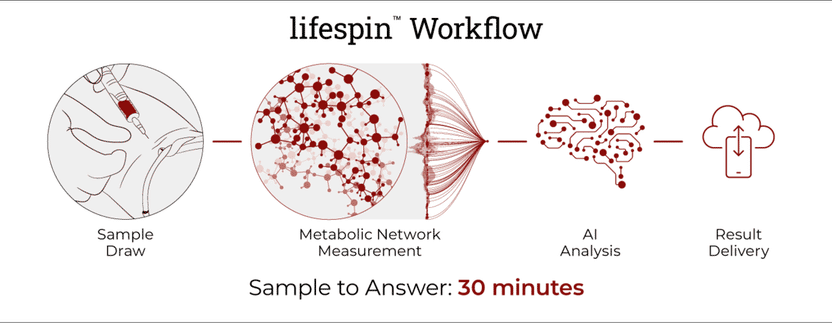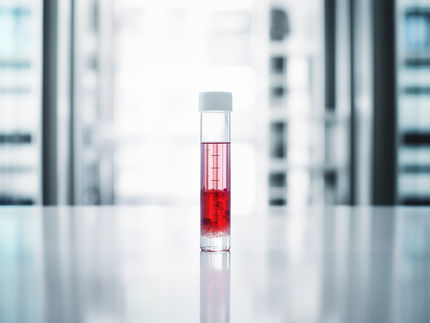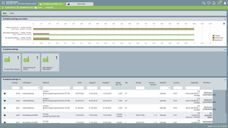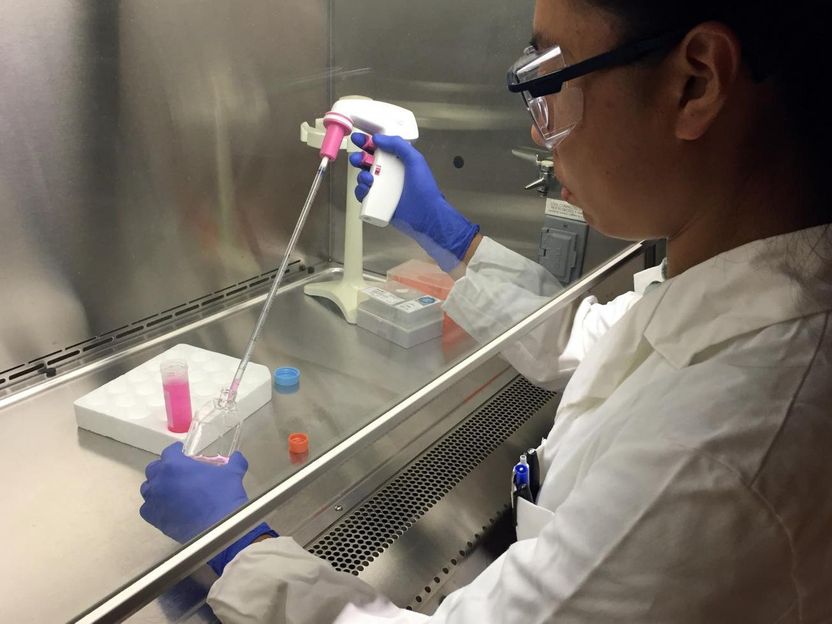Lifespin secures bridge financing
Artificial intelligence to determine health status and diagnose diseases
Lifespin GmbH in BioPark Regensburg has successfully concluded bridge financing to a total of € 2.5 million. The diagnostic data company is working successfully on an AI-based health platform that can measure important metabolic parameters in patients and expects to start series A in the funding cycle in 2022.

A person's metabolic status is measured quantitatively with NMR and processed with lifespin’s™ own advanced artificial intelligence (AI) and deep learning algorithms to determine health status and diagnose diseases, and the results are made available via the cloud.
Copyright: lifespin GmbH
The company, which was founded in 2017 at the BioPark, is one of the so-called "deep data companies", which is currently developing its own AI-based health test platform for measuring quantitative metabolic data in patient samples. To this end, an interdisciplinary team of 17 employees combines diagnostic and bioanalytical methods with software solutions, in particular the use of artificial intelligence (AI). With the aid of the most modern analyzes based on nuclear magnetic resonance technology, a database of metabolic profiles of more than 130,000 patients has already been built up, which already today enables the analysis of more than a billion metabolic interactions. Systematic mapping can standardize human health in terms of metabolism. Significant deviations in the metabolite profile enable early diagnosis of diseases and individual monitoring in the course of therapy. Pathogenesis affects metabolism and causes specific changes in the presence and amount of certain metabolites.
Lifespin's pioneering business idea of mapping human health on the basis of metabolomics secured the diagnostics company bridging funding of € 2.5 million to advance development. The Lifespin platform is based on mapping the human health metabolome and translating that data into health information that can be used in a variety of pharmaceutical, research and clinical settings. Lifespin's health diagnostic software will be applicable to the broader healthcare sector, from diagnostics to patient stratification to personalized medicine, as well as to support the drug discovery process. "We are very excited about Lifespin's growth path with a platform solution that collaborating clinical laboratories and drug discovery partners can access and that can be scaled globally via our cloud solutions," said Dr. Ali Tinazli, CEO of Lifespin.
The bridging funding will be used to continue the development of the first diagnostic panel for neurological diseases such as multiple sclerosis and Parkinson's disease, some of which cannot be diagnosed using traditional laboratory-based methods. The first commercial test of the differential diagnostics panel will cover early stages of multiple sclerosis. The panel will be expanded to include other neurological indications over time. "Lifespin's new software-based approach to digitally recording, comparing and analyzing human metabolomes will open up a new and exciting field that complements existing health diagnostics," said Robert Wieland, Managing Director of Wieland Capital, based in Munich and main investor in Lifespin. Lifespin expects to begin fundraising for a series A in 2022 to fund initial product launches and help expand its business into the United States. After the start-up financing (seed, proof of concept), the series A financing is an important milestone for the company. If successful, series B will follow in the form of growth capital.
Other news from the department business & finance
These products might interest you
Most read news
More news from our other portals
Something is happening in the life science industry ...
This is what true pioneering spirit looks like: Plenty of innovative start-ups are bringing fresh ideas, lifeblood and entrepreneurial spirit to change tomorrow's world for the better. Immerse yourself in the world of these young companies and take the opportunity to get in touch with the founders.
See the theme worlds for related content
Topic world Diagnostics
Diagnostics is at the heart of modern medicine and forms a crucial interface between research and patient care in the biotech and pharmaceutical industries. It not only enables early detection and monitoring of disease, but also plays a central role in individualized medicine by enabling targeted therapies based on an individual's genetic and molecular signature.

Topic world Diagnostics
Diagnostics is at the heart of modern medicine and forms a crucial interface between research and patient care in the biotech and pharmaceutical industries. It not only enables early detection and monitoring of disease, but also plays a central role in individualized medicine by enabling targeted therapies based on an individual's genetic and molecular signature.


























































